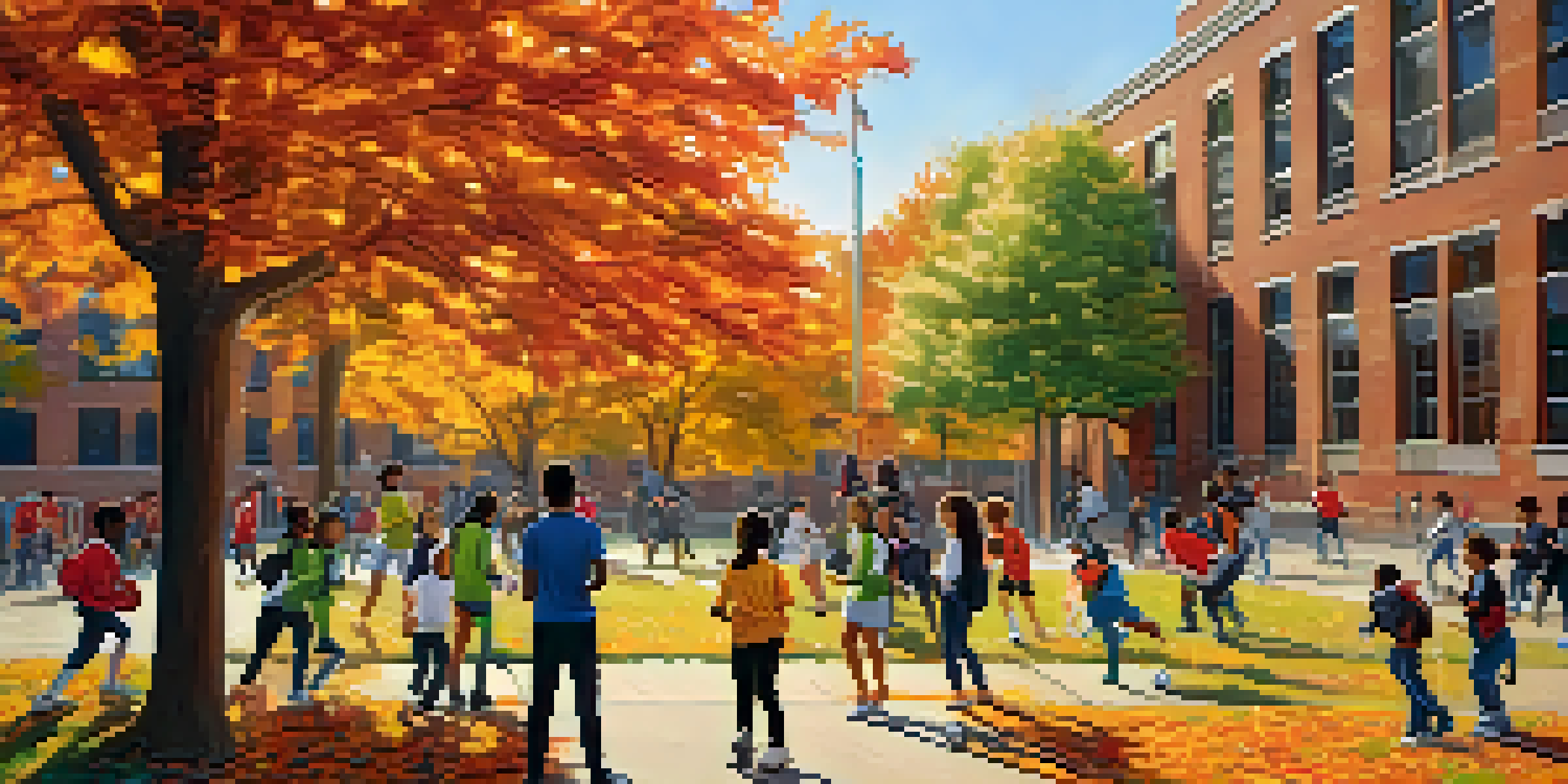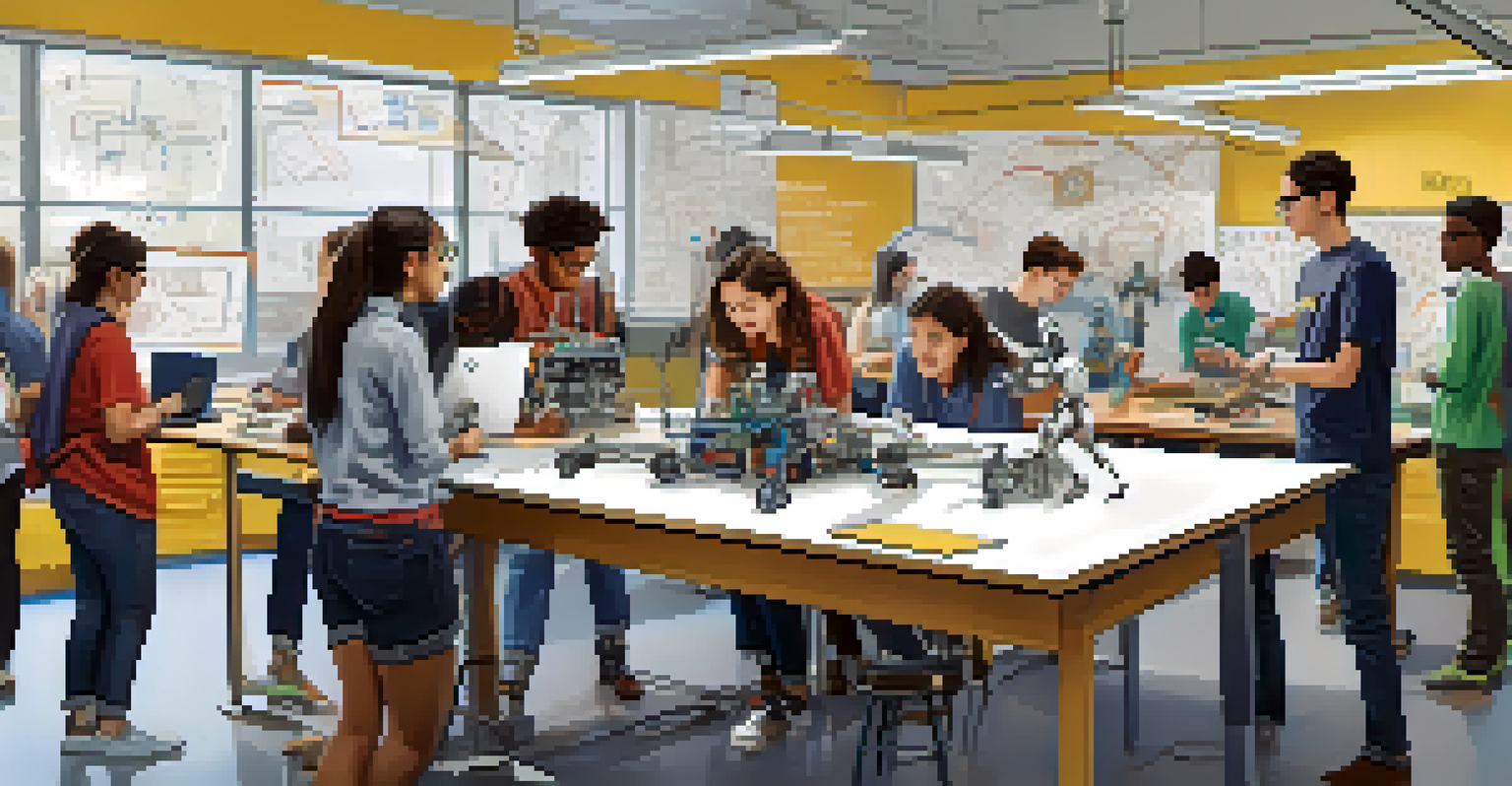How Extracurricular Activities Enhance NYC Students' Learning

The Role of Extracurricular Activities in Education
Extracurricular activities play a vital role in shaping students' educational experiences. They provide opportunities for students to engage in learning beyond the traditional classroom setting. In New York City, where educational competition is fierce, these activities can help students stand out and develop valuable skills.
Extracurricular activities are the best way for students to develop their interests and passions outside the classroom, preparing them for future success.
Participating in clubs, sports, or the arts allows students to explore their passions and interests. This exploration can lead to increased motivation in their academic pursuits. Moreover, these activities foster a sense of belonging and community, which is essential for overall well-being.
When students are engaged in extracurriculars, they often develop better time-management skills. Balancing these activities with academics teaches them responsibility and discipline, essential traits for future success. This holistic approach to education is increasingly recognized as vital for student development.
Building Valuable Life Skills Through Activities
One of the most significant benefits of extracurricular activities is the development of crucial life skills. Students learn teamwork, leadership, and communication through collaborative projects and performances. These skills are not only applicable in school but also in future workplaces.

For instance, being part of a sports team requires students to work together towards a common goal. They learn to support one another, celebrate victories, and handle defeats gracefully. This experience mirrors real-world scenarios where collaboration is key to success.
Extracurriculars Enhance Learning
Extracurricular activities provide students with opportunities to develop skills and motivation that enhance their overall educational experiences.
Additionally, participating in clubs that require planning and execution, such as a debate club or school newspaper, hones organizational skills. Students learn to set goals, manage their time effectively, and take initiative. These competencies are invaluable as they move forward in their academic and professional journeys.
Enhancing Social Connections and Community Engagement
Extracurricular activities are a fantastic avenue for students to forge new friendships and expand their social circles. In the diverse landscape of New York City, these interactions can encourage inclusivity and cultural exchange. Students often connect with peers who share similar interests, fostering a sense of community.
Education is not just about acquiring knowledge; it's about developing skills that will serve you for a lifetime.
Engaging in community service through school clubs instills a sense of responsibility and empathy. Students learn about the importance of giving back and can see firsthand the impact of their contributions. This engagement helps them develop a deeper connection to their community.
Moreover, these activities can lead to networking opportunities that benefit students long after graduation. The relationships built in extracurriculars can evolve into mentorships or professional connections, opening doors for future career paths. Such bonds are often built on shared experiences and mutual support.
Boosting Academic Performance Through Engagement
Numerous studies have shown that students who participate in extracurricular activities tend to perform better academically. The skills and discipline gained from these activities often translate into improved focus and motivation in their studies. This connection highlights the importance of a well-rounded education.
For example, students involved in music programs often excel in math and science. The discipline required to practice an instrument can enhance cognitive skills that are beneficial across subjects. This synergy between academics and extracurricular participation is invaluable.
Life Skills through Activities
Participation in clubs and teams fosters essential life skills like teamwork, leadership, and communication that are valuable in both school and future careers.
Furthermore, the stress-relieving aspects of extracurricular activities can lead to better mental health. When students have an outlet for creativity or physical activity, they are often more resilient in the face of academic pressures. This balance is crucial in the fast-paced environment of NYC schools.
Fostering Creativity and Innovation in Students
Extracurricular activities often provide a canvas for students to express their creativity. Whether through visual arts, theater, or writing clubs, students can explore their imaginative sides. This freedom to create leads to innovative thinking, a skill that is highly valued in today’s world.
For example, participation in a theater group can enhance not only acting skills but also confidence and public speaking abilities. These experiences empower students to think outside the box and approach challenges with a creative mindset. Such skills are essential for problem-solving in any field.
Moreover, creative activities can spark interests that might influence career choices. Students who dabble in various forms of art or design may discover a passion for a future profession. This exploration is vital in helping them find their unique place in the world.
Catering to Diverse Interests and Talents
New York City schools offer a plethora of extracurricular activities that cater to a wide range of interests and talents. From robotics clubs to dance teams, there is something for everyone. This variety encourages students to step out of their comfort zones and try new things.
Such exposure can lead to the discovery of hidden talents and passions. A student who initially joins a coding club might find a love for technology that influences their educational path. This exploration is essential in a city known for its dynamic and diverse opportunities.
Boosted Academic Performance
Students involved in extracurriculars often show improved academic performance due to better focus, discipline, and stress relief from their activities.
Furthermore, these activities can help students build confidence in their unique abilities. As they engage and excel, they develop a stronger sense of self-worth. This confidence spills over into their academic pursuits, enhancing their overall educational experience.
Preparing Students for Future Success
Extracurricular activities play a crucial role in preparing students for their future careers. The skills acquired through participation—teamwork, leadership, and creativity—are highly sought after by employers. In a competitive job market, these experiences can set candidates apart.
Additionally, students who engage in relevant extracurriculars can build a portfolio of experiences that showcases their abilities. For instance, a student involved in technology clubs may have projects to demonstrate during job interviews. This practical experience can enhance their employability.

Moreover, the networking opportunities created through these activities can lead to internships or job offers. Connecting with professionals in their fields of interest allows students to gain insights and guidance that can be invaluable. This preparation is essential for navigating the complexities of the job market.
Conclusion: The Comprehensive Benefits of Extracurriculars
In conclusion, extracurricular activities significantly enhance the learning experiences of NYC students. They provide a well-rounded education that promotes personal growth, social connections, and academic success. The skills and experiences gained through these activities are crucial for future endeavors.
As students explore their interests and develop new talents, they become more engaged and motivated learners. This engagement not only benefits their academic performance but also contributes to their overall well-being. The diverse opportunities available in New York City play a pivotal role in shaping the next generation.
Ultimately, encouraging participation in extracurricular activities is essential for nurturing well-rounded individuals. As students thrive in their pursuits outside the classroom, they develop the skills and confidence necessary to succeed in life. This holistic approach to education is what makes NYC schools truly unique.